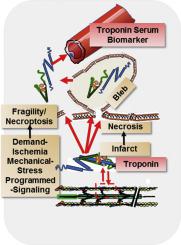当前位置:
X-MOL 学术
›
J. Mol. Cell. Cardiol.
›
论文详情
Our official English website, www.x-mol.net, welcomes your feedback! (Note: you will need to create a separate account there.)
Implications of the complex biology and micro-environment of cardiac sarcomeres in the use of high affinity troponin antibodies as serum biomarkers for cardiac disorders.
Journal of Molecular and Cellular Cardiology ( IF 5 ) Pub Date : 2020-05-19 , DOI: 10.1016/j.yjmcc.2020.05.010 Christopher R Solaro 1 , R John Solaro 2
Journal of Molecular and Cellular Cardiology ( IF 5 ) Pub Date : 2020-05-19 , DOI: 10.1016/j.yjmcc.2020.05.010 Christopher R Solaro 1 , R John Solaro 2
Affiliation

|
Cardiac troponin I (cTnI), the inhibitory-unit, and cardiac troponin T (cTnT), the tropomyosin-binding unit together with the Ca-binding unit (cTnC) of the hetero-trimeric troponin complex signal activation of the sarcomeres of the adult cardiac myocyte. The unique structure and heart myocyte restricted expression of cTnI and cTnT led to their worldwide use as biomarkers for acute myocardial infarction (AMI) beginning more than 30 years ago. Over these years, high sensitivity antibodies (hs-cTnI and hs-cTnT) have been developed. Together with careful determination of history, physical examination, and EKG, determination of serum levels using hs-cTnI and hs-cTnT permits risk stratification of patients presenting in the Emergency Department (ED) with chest pain. With the ability to determine serum levels of these troponins with high sensitivity came the question of whether such measurements may be of diagnostic and prognostic value in conditions beyond AMI. Moreover, the finding of elevated serum troponins in physiological states such as exercise and pathological states where cardiac myocytes may be affected requires understanding of how troponins may be released into the blood and whether such release may be benign. We consider these questions by relating membrane stability to the complex biology of troponin with emphasis on its sensitivity to the chemo-mechanical and micro-environment of the cardiac myocyte. We also consider the role determinations of serum troponins play in the precise phenotyping in personalized and precision medicine approaches to promote cardiac health.
中文翻译:

高亲和性肌钙蛋白抗体作为心脏疾病的血清生物标志物的使用,对心脏肉瘤复杂的生物学和微环境的影响。
肌钙蛋白I(cTnI)的抑制单元和心肌肌钙蛋白T(cTnT)的肌钙蛋白异源三聚体肌钙蛋白复合物信号激活的肌钙蛋白结合单元以及钙结合单元(cTnC)心肌细胞。cTnI和cTnT的独特结构和心脏心肌细胞的限制性表达导致其在30年前开始在全世界用作急性心肌梗塞(AMI)的生物标志物。这些年来,已经开发出高灵敏度的抗体(hs-cTnI和hs-cTnT)。结合仔细确定病史,体格检查和心电图,使用hs-cTnI和hs-cTnT确定血清水平可对急诊科(ED)出现胸痛的患者进行危险分层。能够以高灵敏度确定这些肌钙蛋白的血清水平的问题是,这种测量在AMI以外的疾病中是否具有诊断和预后价值。此外,要发现处于生理状态(例如运动和病理状态,可能会影响心肌细胞)的血清肌钙蛋白水平升高,需要了解肌钙蛋白如何释放到血液中以及这种释放是否是良性的。我们通过将膜的稳定性与肌钙蛋白的复杂生物学联系起来来考虑这些问题,重点是肌钙蛋白对心肌细胞的化学机械和微环境的敏感性。我们还考虑了血清肌钙蛋白在促进心脏健康的个性化和精确医学方法中在精确表型中所起的作用。
更新日期:2020-05-19
中文翻译:

高亲和性肌钙蛋白抗体作为心脏疾病的血清生物标志物的使用,对心脏肉瘤复杂的生物学和微环境的影响。
肌钙蛋白I(cTnI)的抑制单元和心肌肌钙蛋白T(cTnT)的肌钙蛋白异源三聚体肌钙蛋白复合物信号激活的肌钙蛋白结合单元以及钙结合单元(cTnC)心肌细胞。cTnI和cTnT的独特结构和心脏心肌细胞的限制性表达导致其在30年前开始在全世界用作急性心肌梗塞(AMI)的生物标志物。这些年来,已经开发出高灵敏度的抗体(hs-cTnI和hs-cTnT)。结合仔细确定病史,体格检查和心电图,使用hs-cTnI和hs-cTnT确定血清水平可对急诊科(ED)出现胸痛的患者进行危险分层。能够以高灵敏度确定这些肌钙蛋白的血清水平的问题是,这种测量在AMI以外的疾病中是否具有诊断和预后价值。此外,要发现处于生理状态(例如运动和病理状态,可能会影响心肌细胞)的血清肌钙蛋白水平升高,需要了解肌钙蛋白如何释放到血液中以及这种释放是否是良性的。我们通过将膜的稳定性与肌钙蛋白的复杂生物学联系起来来考虑这些问题,重点是肌钙蛋白对心肌细胞的化学机械和微环境的敏感性。我们还考虑了血清肌钙蛋白在促进心脏健康的个性化和精确医学方法中在精确表型中所起的作用。



























 京公网安备 11010802027423号
京公网安备 11010802027423号